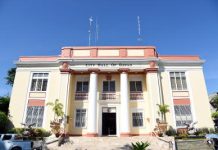
Environmental group Interfacing Development Interventions for Sustainability (IDIS) said on Monday that the implementation of solid waste segregation or the Republic Act 9003 in Davao City remains weak and needs more push to really address the city’s solid waste problems.
The Republic Act (RA) 9003, otherwise known as the Ecological Solid Waste Management Act of 2000, provides the necessary policy framework, institutional mechanisms, and mandate to the local government units (LGUs) to achieve 25 percent waste reduction through establishment an integrated solid waste management plans based on 3Rs (reduce, reuse and recycling).
IDIS executive director lawyer Mark Peñalver said in Davao City, out of 182 barangays, less than 30 percent have Material Recovery Facilities (MRFs), yet, less than 20 percent of these barangays have functional MRFs.
“Kung makita nato in barangay level naa gyud weak implementation with regards to segregation. Under RA 9003 naay ginaingon didto na all barangays are mandated to construct their own MRFs meaning didto sa barangay dapat segregated na ang atong basura. Kung tan awon nato ang implementation sa RA 9003 kay weak sa Davao City. Every year naga increase ang atoang basura nga nagaadto sa atoang landfill. Based on data starting 2017 to 2022 increasing ang atoang gina generate na waste,” he said during the Kapehan sa Dabaw at SM City Davao on Monday.
He said that what should be done is to find sustainable solutions and invest in reducing waste generation.
“Mag start gyud na siya if the city government of Davao will recognize that there is a problem sa implementation sa atoang solid waste management and policies and as long as dili na i-recognize sa city dili gyud nato na ma-address and we should find solutions na sustainable. Karon man gud ang gina-propose is unsustainable project and that is the Waste-to-Energy,” he said.
He said reducing the city’s waste generation will have an impact on the waste that goes to the landfill as most of the waste in the landfill are combustibles.
“If kato (plastics) mabilin sa barangays residuals ra gyud ang malabay sa landfill ug ang life span sa atong landfill mas mag extend pa kay ang atong landfill karon is operating beyond its life span, which is a reflection sa weak implementation sa balaod on solid waste management sa city,” he said.
Meanwhile, Davao City First District Councilor Temujin “Tek” Ocampo announced last Wednesday that Davao City’s WTE is just awaiting the approval from the National Economic and Development Authority (NEDA).






